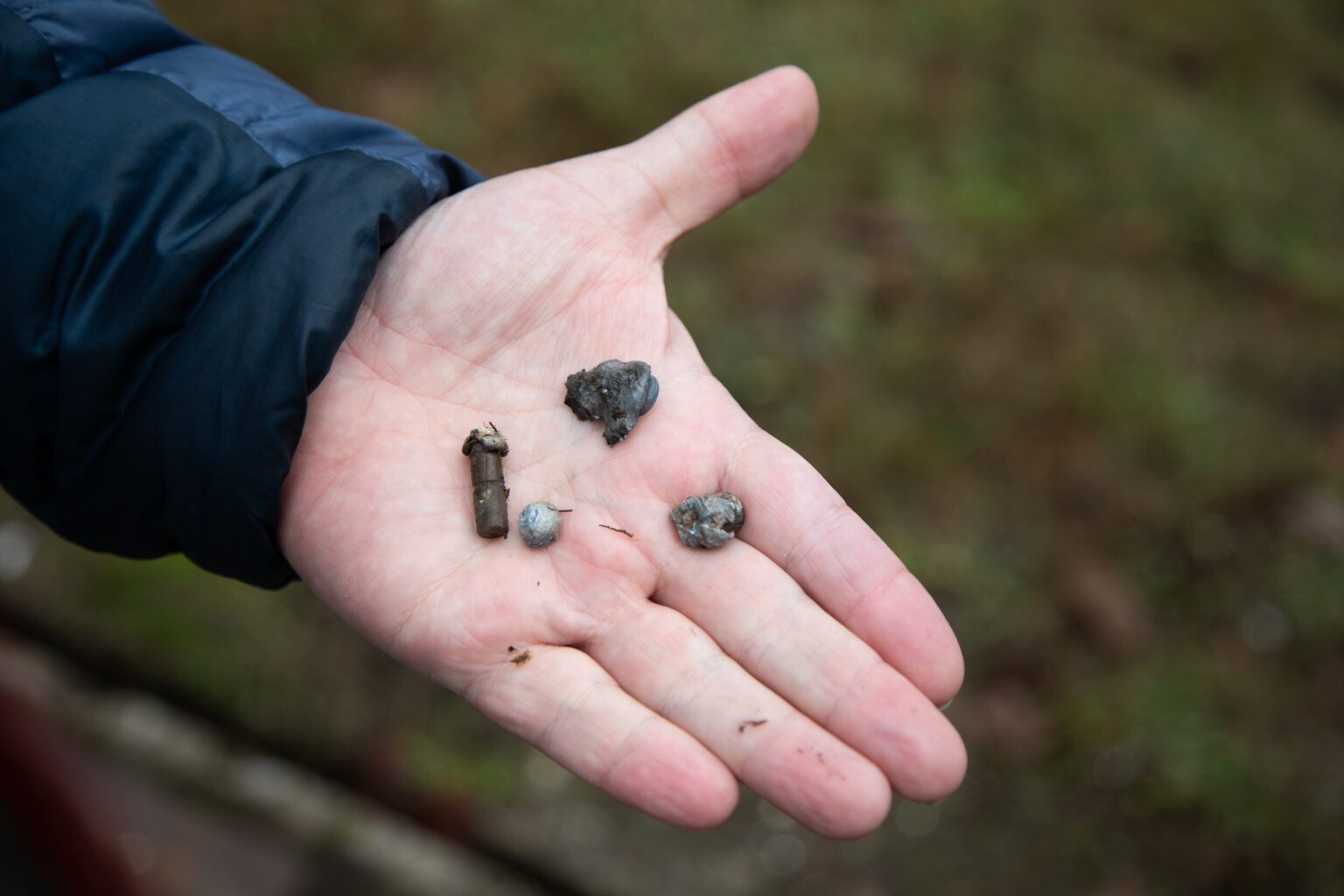Editor’s note: Off Target: A legacy of neglect at county rifle range is a multipart special report exploring the county’s operations at Plantation Rifle Range, one of two publicly owned ranges in the state. Part one explores environmental concerns at the outdoor, high-power range at Plantation.
Armed only with a generic black trash bag and a small shovel, Morgana Bird wiped the sweat off her brow with the back of her garden-gloved hand. It was early June 2022, and Bird was trudging through five decades of bullet debris at Whatcom County’s Plantation Rifle Range.
Bird, 25, a seasonal employee for the county’s Parks & Recreation “mow team,” was tasked with the Herculean cleanup of the high-power rifle range, south of Bellingham. Three hundred yards of grassy wetland and a slow-flowing stream stretched between the firing line and a manmade berm, where several tons of bullet debris had accumulated for years. Bird and two other seasonal staffers were among the first to try to make a dent in what now looms as a daunting, expensive cleanup project.
Bird said she and her two co-workers were given limited instructions or information about how to clean up the range, armed only with trash bags, gardening gloves and N95 masks — “if we wanted them.”
The range, operated by Whatcom County since the early 1970s, would typically be full on a sunny June afternoon: locals prepping for hunting season, police training new recruits.
Plantation Rifle Range is located just off of Interstate 5, south of Bellingham, where several small neighborhoods have sprouted within just a quarter-mile of the outdoor ranges.
Bird didn’t know it at the time, but her attempts at a cleanup — several days spent scooping shovels of dirt and bullets — were only the beginning. In the months that followed, she would file an official, though anonymous, complaint about the facility with the Washington State Department of Ecology, air her concerns with supervisors and ultimately, in early September 2022, lose her job.
Today, the three ranges at Plantation — the outdoor high-power range, the indoor pistol range and the outdoor small-bore range — are closed indefinitely, while county employees, state officials and Ecology investigators conduct tests and cleanup procedures to remove several tons of lead-contaminated soil at the 60-acre facility.
Cleanup is vital: through 50 years of operation, the county has never conducted lead cleanup or mitigation at the outdoor range, leaving decades of debris in the earth, creating serious concern for the wetlands and creek along the property, which drains into Lake Samish watershed.
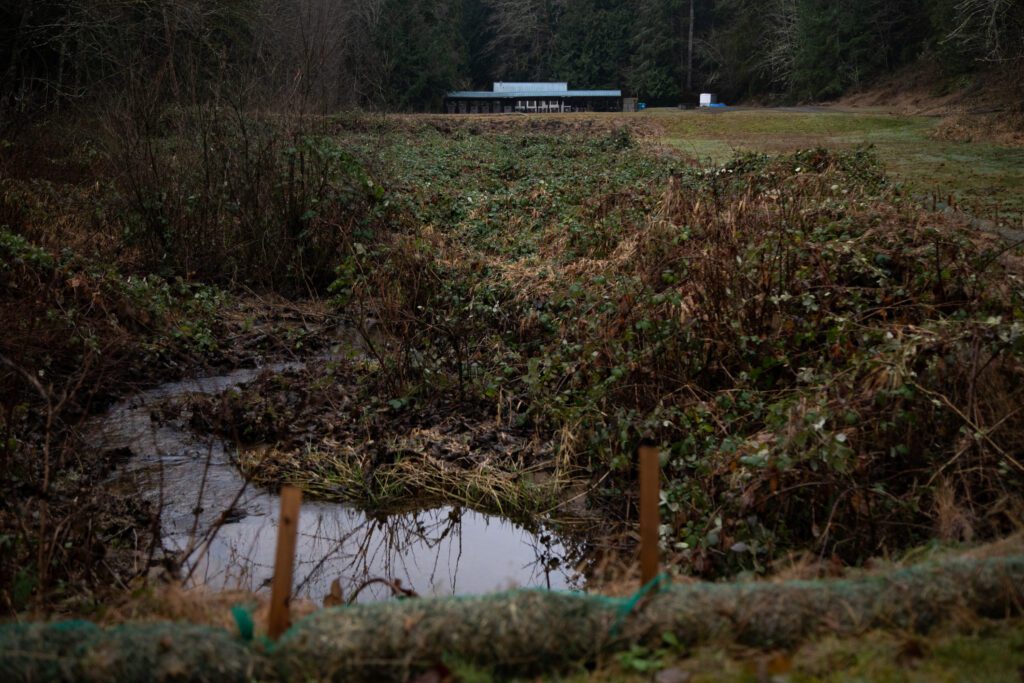
“The first 4-plus inches of ground were more casings than soil,” Bird said after losing her job. “The bullet casings went easily 6 or 7 inches deep … It looked like years and years of neglect.”
The berm, a massive, 50-year-old eyesore filled with tires and other rubber debris at the back of the range, catches stray bullets before they can enter the woods and neighboring homes.
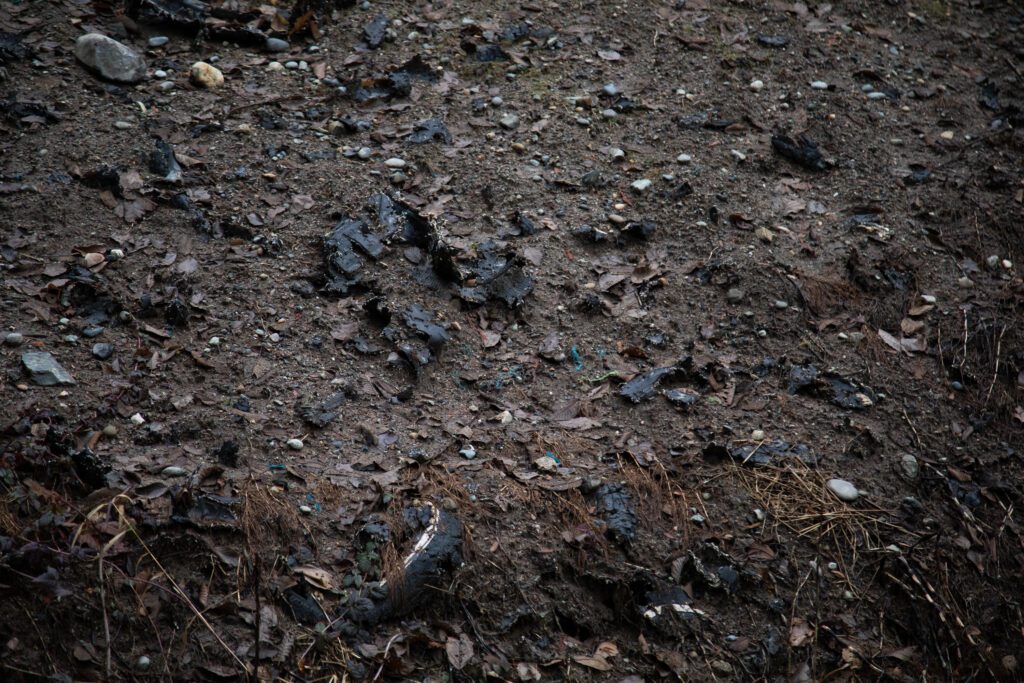
“They had us go out there with rakes and shovels,” she said. “We were told to put everything into garbage bags and then just toss it in the dumpster at the end of the parking lot.”
The lead in bullets is toxic, and cannot be properly disposed of in a regular landfill. It’s considered hazardous waste, so disposal often requires barrels, haul teams and careful labeling.
Though her report to Ecology was anonymous, Bird suspects her supervisors knew she filed it.
“It could genuinely be a coincidence, but a week after [Ecology] sent over a request to the department … they let me and my coworker who was with me go,” she said. “They knew it had to be one of two people they sent out.”
The high-power range — the only one at Plantation open at the time — officially closed in November last year, pending cleanup and mitigation plans, now projected to cost more than $1 million and take months, if not years, to complete, placing the facility’s future in doubt.
A long trail of neglect
As one of two publicly owned ranges in the state, Plantation sees heavy use year-round from recreational shooters and police trainees from local, state and federal agencies. When it was established in the ’70s, environmental protection wasn’t a priority.
Plantation was designed before environmental regulations existed for shooting facilities, which now require regular cleanup with modern technology.
“This was the early ’70s — the very start of the environmental movement,” Ecology’s Scarlet Tang said. “Lead just wasn’t on people’s minds at that time.”
Current county leadership is not responsible for the original practices or for establishing the range in an environmentally sensitive area, but in recent years, county staff failed to update regulations at the range.
Jed Holmes, the county’s community outreach facilitator, said the county didn’t necessarily realize existing practices at the range needed to change or meet new environmental regulations created by the state.
“In retrospect, we recognize that it’s something that should have been on our radar,” Holmes said in February. “There is definitely a tradition of waiting for action from [state and federal] levels. Something is not a problem until you’re told it’s a problem or someone complains. That might not be a good tradition.”
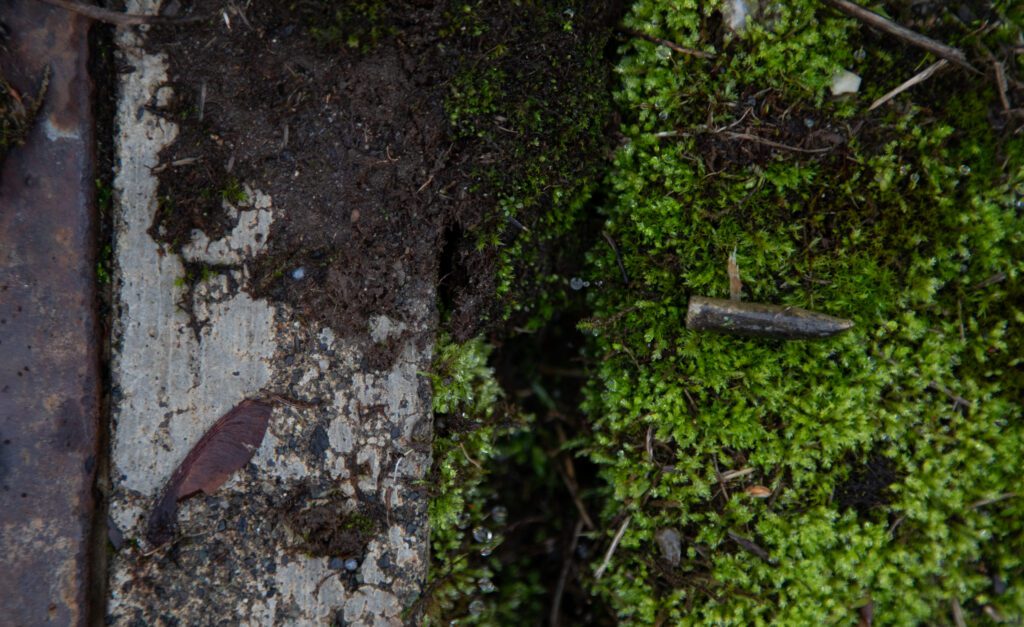
Christ Thomsen, the county’s parks operations manager for almost a decade, following a 13-year stint at the state Department of Natural Resources, voiced similar sentiments.
“[Lead reclamation] is just another one of those things that wasn’t a common activity,” Thomsen said during a tour of the range in January. “It’s a more recent development in the management of ranges.”
Holmes said context, too, is important.
In the United States, lead is considered a toxic substance, but is regulated at the state and federal level, not at the county level — and the substance is commonplace.
“Lead ammunition is allowed in every state except California, which implemented a ban in 2019,” he said. “Lead fishing tackle is allowed in all our lakes, rivers and streams. Lead was added to gasoline in America until the mid-1990s.”
But lead is heavily regulated today. In 1978, the country banned lead-based paints — once regularly used in homes and schools — from residential use. Toys and infant products are required to be tested for lead after a 2008 law. And lead fishing tackle, including sinkers and jigs that measure 1.5 inches or less, are banned at 12 lakes in Washington.
Lead bullets, too, are banned in some areas. The Washington Department of Fish and Wildlife has banned lead shot use when hunting several species of birds and waterfowl.
At the facility’s outdoor ranges, the county failed to conduct lead reclamation across 50 years of ownership and management. Employees did, however, conduct proper cleanup and disposal of lead bullet casings and fragments from the facility’s indoor range for years.
Receipts and deposit slips from county records show barrels full of lead deposited at hazardous waste sites over the years — but never from the facility’s outdoor ranges.
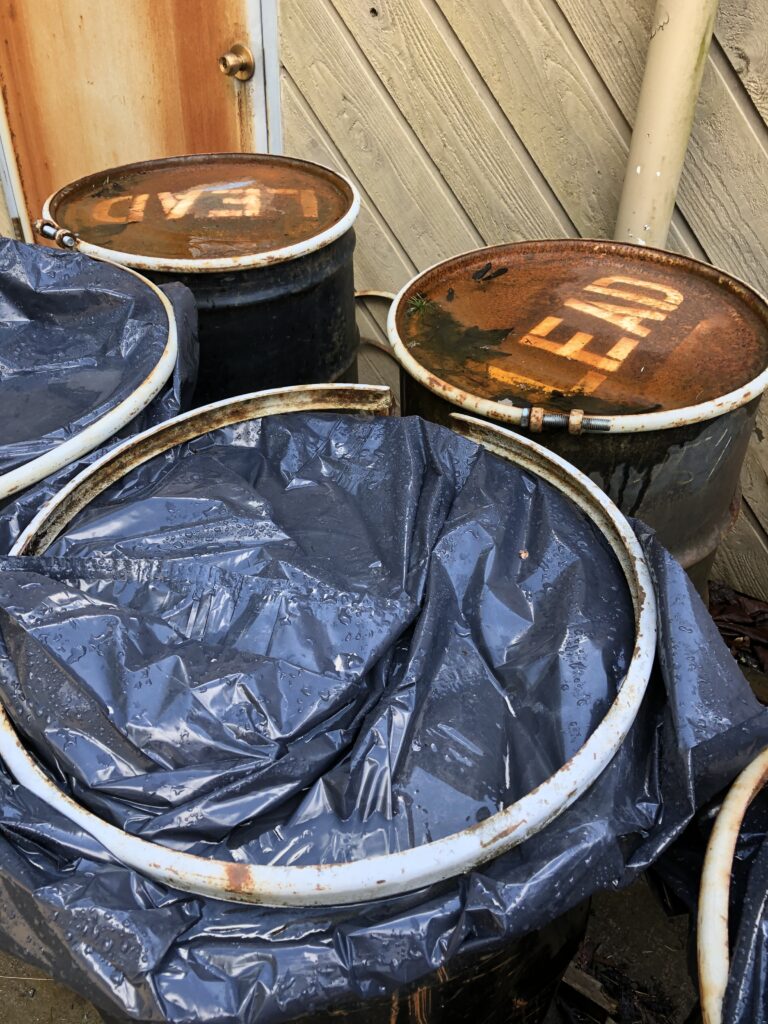
“At least for some [of the facility], they knew what they should have been doing,” Ecology’s Christa Colouzis said. “It took too long for it to get to where it needed to be.”
Current estimates put the cleanup process at $1.35 million, with more than half of the funds from an Ecology grant approved by Whatcom County Council in early February.
Though cleanup is mandatory, reopening the range may not be in the cards.
2022 closures: too little, too late?
When Bird and her co-workers stripped the first layer of earth from the ground last year, they uncovered lead threatening to leach into a nearby creek.
Now, the area is covered in thick piles of mulch, capping the unstable land where lead reclamation was deemed too dangerous to conduct.
In the months after Bird filed her complaint, Ecology became heavily involved in cleanup, mandating steps to address lead buildup in soil and water.
The fate of the employee — who acted a whistleblower when filing her anonymous complaint — was left to the county. Leaders there including Holmes and Thomsen insist Bird’s dismissal was neither retaliation nor an attempt to silence a worker. Seasonal employees, they said, are hired at-will, based on needs, and it is rare for one to work past their initial term.
Between May and July last year, the county brought on 22 seasonal hires, including Bird, who was hired May 4. Of the 22 hired that summer, one voluntarily resigned and two were still working for the county in January 2023. The remaining 19 were terminated, though more than half of them were terminated after Bird. The last termination occurred in late November.
Whatcom County has several protocols in place to protect whistleblowers from wrongful termination, including a 1993 policy protecting employees who report “improper governmental action.” Bird said she was not aware of the policies.
None of the supervisors she spoke with following the first cleanup provided her with the county guidelines and whistleblower-protection documents, which dictate how to file a complaint and list timelines and investigation details, she said. The documents also say county employees who fail to follow local procedures “shall not be entitled to receive the protections provided by the Whatcom County government.”
Without the guidelines, it did not occur to Bird that she might have had access to whistleblower protections, nor that she should contact Human Resources to file a wrongful termination complaint, she said.
Ecology representatives called the timing of Bird’s termination “suspicious,” but declined to go further.
Bird said she has no intention of filing a wrongful termination lawsuit against the county.
In email exchanges viewed by Cascadia Daily News, Thomsen confirmed the county disposed of eight “partially filled trash bags” of debris in the on-site dumpster, as Bird reported.
Concerns about lead disposal, though, emerged long before Bird’s warning.
A decade of knowledge
Email exchanges obtained by CDN between Ecology, neighbors, and the county indicate county leadership, including Thomsen, knew about lead concerns at Plantation for more than a decade.
“I received a call from a concerned citizen about what she believes is lead shot used at the Plantation Rifle Range near her home,” wrote an Ecology employee in October 2012. “She wants to know if the lead is being managed in any way and if it is a threat to local water supplies or neighbors.”
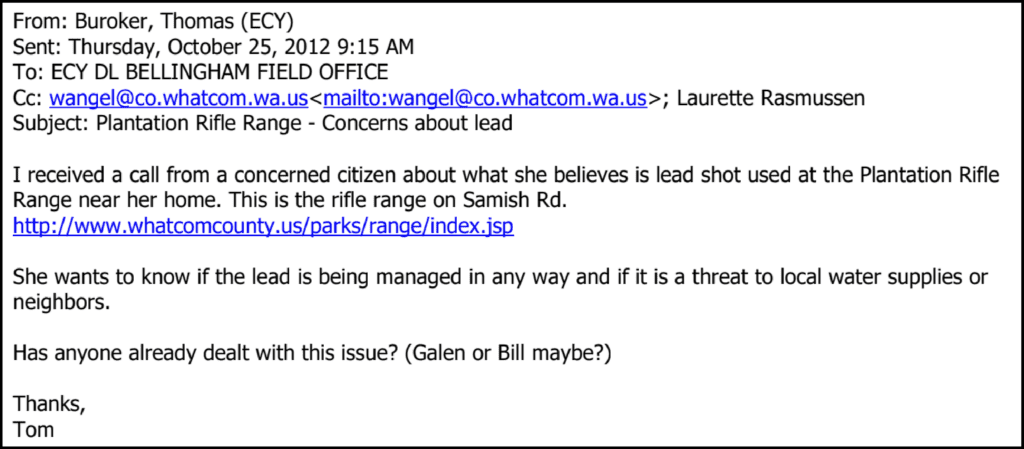
The county health department responded the facility “likely has lead shot in soil to deal with from current and past practices.”
Over the years, these concerns were echoed to Thomsen through repeated investigations and site visits from Ecology and the state department of Labor & Industries.
In 2005, the EPA released a “best management practices” guide for outdoor shooting ranges. The guide recommended collection of lead bullets and bullet fragments, preventing migration of lead to the surrounding water bodies, removal of the lead from the range and documenting all activities. The county has had a copy of the guidelines for years.
“The county was sent EPA’s best management practice guidance and they were told to follow it,” Colouzis said. “I think the county’s problem [in following the guidelines] was really part financial, and part, once a problem gets so big, it’s like where do we even start?”
Ecology has long been concerned about the facility, which showed noncompliance with state environmental laws and requirements several times over the last decade. Investigators for the department reported specific concerns with the indoor range in 2017. During follow-ups, investigators discovered significant environmental hazards with the outdoor ranges.
After the 2017 inspection, the county submitted a “return to compliance” certification, Colouzis said, indicating environmental concerns were addressed. But when investigators returned in 2020, they found many of the same issues.
In 2020, the department requested the county begin conducting monthly surface water sampling. Five sampling sites around Plantation are now in use.
Since the county began testing samples in November that year, they have not seen any evidence that shows “lead levels in water approaching a concentration that would present a human health hazard,” Thomsen reported at a November meeting about the range closure.
“We’ve not seen any data that indicates [threat to human health] at this time,” he reiterated during a tour of the facility in January.
Ecology confirmed the data hasn’t shown lead levels “dangerous to human health,” but includes an asterisk: Lead concentrations exceeded chronic aquatic water quality standards 15 times during testing between December 2020 and November 2021, the agency reported.
While those concentrations are not immediately dangerous to human health, they are to benthic organisms — the tiny creatures that live in creeks and watersheds. They live at the bottom of the food chain, and eventually, it all adds up, said Colouzis, noting that the chain ends with people eating fish.
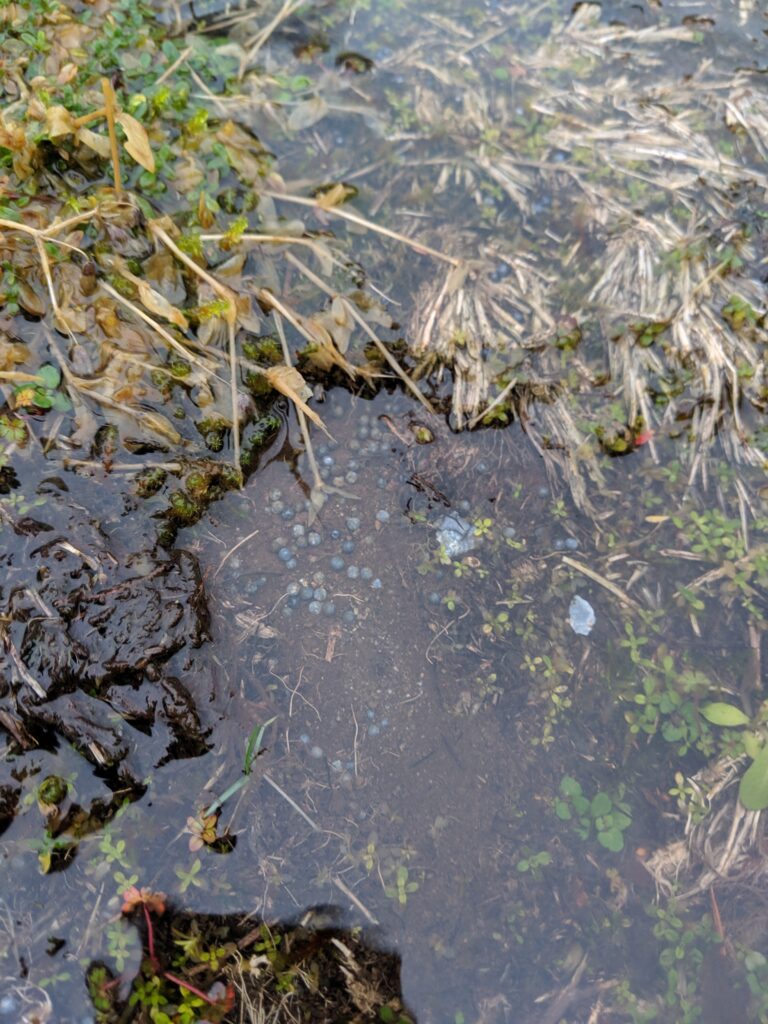
In November 2021, catastrophic floods that destroyed communities around Whatcom County also hit Plantation, carrying significant sediment — including lead-contaminated casings — into the mouth of the creek, which feeds Lake Samish.
“With the current setup, it is impossible to operate the high power range without continuing to contaminate the creek,” according to documents from Ecology, which noted that 95% of the residents surrounding Lake Samish draw water from the lake. “Pollution to drinking water sources is undetermined.”
Looking forward
Neither Whatcom County nor Ecology know just how long the cleanup process will take at the outdoor ranges. Early estimates indicate the county may be able to reopen the high-power range as early as late 2024, but that’s just a guess, newly appointed Parks Director Bennett Knox said.
“It’s always a possibility” the facility won’t reopen, Knox said in January. County officials, he said, need to determine what future operating costs might be, how that impacts county budgets and the future of development in the region. Already, several homes have been built within half a mile of the range, and future development may further hinder shooting.
View a larger version of the timeline here
“In an ideal world,” Knox added, “we’ll be able to continue to offer the services that we have been, and at the same time, we’ll be fully compliant with regulations.”
The current cleanup budget — $1.35 million, with $655,000 from the county and another $750,000 from Ecology — likely won’t be enough.
The county is evaluating steps to bring the area back into environmental compliance, including lead removal, soil reclamation and significant facility changes including removal of the berm on the high-power range. Other changes may need to be made to the high-power range, including relocating the firing line away from the unnamed creek on site. Cleanup, too, is going to need to be constant.
“We don’t know exactly how far [our budget] is going to go in terms of cleanup,” Knox said. “The likelihood is that we recognize we’re probably going to need some additional funding to make [future operations] happen.”
Part two of Off Target addresses health concerns at the indoor shooting range at Plantation Rifle Range.
This story was updated at 9:55 a.m. on March 2, 2023 to clarify the environmental impact of Nov. 2021 flooding in a stream at the rifle range.
Julia Lerner is a former CDN Environmental Reporter; send tips and information to newstips@cascadiadaily.com.

